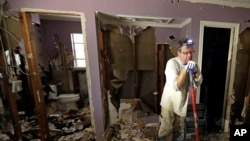Authorities launched a controlled burn Sunday at a chemical plant damaged by Harvey, sending small flames and gray smoke into the sky, and said the highly unstable compounds that had exploded earlier needed to be neutralized.
Officials said the "proactive measures" to ignite the six remaining trailers at the Arkema plant in Crosby, outside Houston, wouldn't pose any additional risk to the community. People living within a mile and a half of the site are still evacuated.
Small flames burning in charred structures could be seen at the plant, with a limited amount of light gray smoke. John Rull, who lives close by, told the Houston Chronicle he heard four booms. He said the explosions were louder than one he heard Friday when two containers burned and that there was much more smoke.
Sam Mannan, a chemical safety expert at Texas A&M University, said the latest burn was emitting gray smoke, which indicated a more complete burn with fewer harmful chemicals remaining.
"There are ways to accelerate the process or create more efficient or complete burning," Mannan said.
Three trailers containing unstable compounds had already caught fire at the plant after backup generators were engulfed by Harvey's floodwaters, which knocked out the refrigeration necessary to keep them from degrading and catching fire.
Some Houston officials stressed that the recovery from Harvey was beginning, and Mayor Sylvester Turner proclaimed America's fourth-largest city "open for business." But the on-the-ground reality varied by place.
Utility crews went door-to-door shutting off power and warning those still in some waterlogged homes in western parts of the city that still more flooding could be heading their way - not from rain but from releases of water in overtaxed reservoirs. Thousands of Houston dwellings were under new, mandatory evacuation orders, though about 300 people were thought to be refusing to leave.
Some homes in the area, which included brick two-story and ranch homes with manicured lawns bordering Buffalo Bayou, remained evacuated but people briefly returned Sunday to try to salvage valuables like family photos.
"I called 911 for 15 minutes; no one answered. My neighbor had a canoe and saved us," said Gaston Kirby, who evacuated Aug. 27 with his two young children. When they left, he said, their home had about 2 inches of water and got another 2 feet from Harvey. But the reservoir releases added at least another 3 feet.
Contradictions could be seen as well in some people taking a break from their cleanup efforts in the sweltering heat to worship on a "National Day of Prayer," while others worried about thefts in storm-ravaged neighborhoods.
Harvey slammed into Texas on Aug. 25 as a Category 4 hurricane, but brought the worst flooding to Houston and other areas as a tropical storm. The rain totaled nearly 52 inches (1.3 meters) in some spots, and the storm is blamed for at least 44 deaths.
President Donald Trump has asked Congress for a $7.9 billion down payment toward Harvey relief and recovery efforts. Texas Gov. Greg Abbott suggested the cost of recovery could be as much as $180 billion.
Turner insisted, however, that much of the city was hoping to get back on track after Labor Day.
"Anyone who was planning on a conference or a convention or a sporting event or a concert coming to this city, you can still come," the mayor said on the CBS show "Face the Nation." ''We can do multiple things at the same time."
In the southwest Bellaire neighborhood, police received reports of scavengers picking through water-damaged possessions and urged those cleaning up to keep anything left outside to dry closer to their homes and separate from what was considered a total loss. In the suburb of Dickinson, one homeowner used orange spray paint on a sheet of dirty plywood to warn: "Looters Will B Shot."
Robert Lockey, a 48-year-old school district bus monitor, worked to clean up his flooded home in Spring, Texas, outside Houston, in the 94-degree heat. A pile of wooden doors lay in his yard next to ripped-out drywall.
"They're sweating to death," Lockey said, looking at his neighbors and their similar piles of debris. Added his roommate, Elizabeth Hallman: "This definitely is not fun."
Meanwhile, repairs continued on the water treatment plant in Beaumont, about 85 miles from Houston, which failed after the swollen Neches River inundated the main intake system and backup pumps halted. In the nearby town of Vidor, Pat Lawrence and her fiancé, Jim Frasier, hopped on a tractor, the only way they could make it to services at the Pine Forest Baptist Church.
"You can't hardly comprehend all the water that's around," Lawrence said. "I've been in my house since last Saturday."
Sunday was declared a day of prayer in Texas and across the nation. At St. Joseph Roman Catholic Church in the Gulf Coast city of Port Aransas, the clergy set out holy water and bug spray, and many anointed themselves with both.
"We will remember the destruction of this uninvited guest but we will never stop being a people of hospitality" the Rev. Kris Bauta told about 50 worshippers. Harvey's storm surge ended just three feet from the building.
Outside the town of Liberty, about 45 miles from Houston, dozens of people were still cut off by the swollen Trinity River. Maggie King and her two children greeted a Texas National Guard helicopter that landed at the local fire department with pallets of drinking water.
"It's so far from over," King said. "There's so much more that has to be repaired from here."




